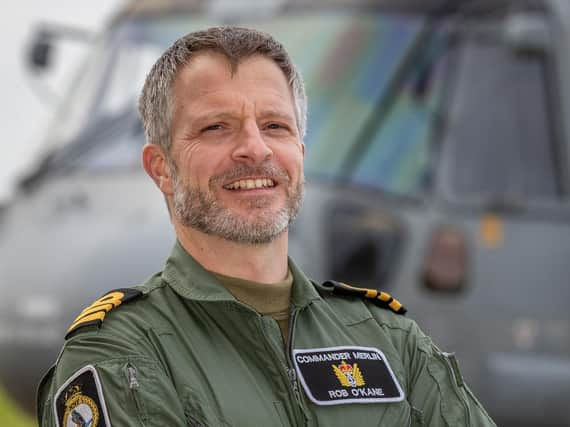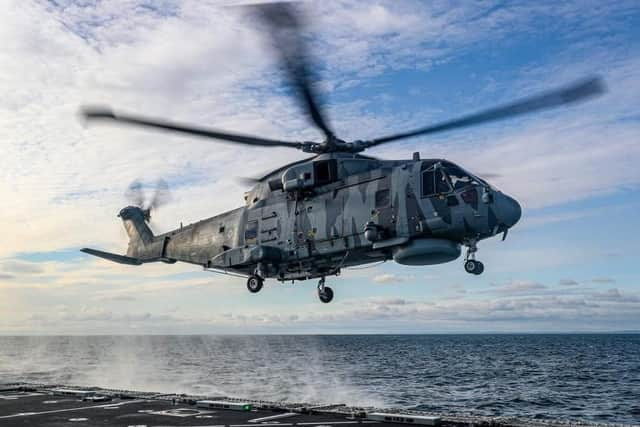Navy serviceman from Wigan earns Commander role


A Wigan-born serviceman has been appointed as the new head of several Royal Navy Helicopter squadrons, tasked with keeping British fleets safe from enemy threats.
Rob O’Kane is the new Commander of the Merlin helicopter force at Royal Naval Air Station Culdrose, in Cornwall.
Advertisement
Hide AdAdvertisement
Hide AdThe base at Culdrose is one of two Fleet Air Arm stations of the Royal Navy, and is the home of anti-submarine helicopter warfare.


Commander O’Kane, who was raised in Swinley and still has strong links to the town, joined the navy in 1998 and trained as an antisubmarine warfare observer.
He later became an instructor and has served on frontline squadrons, including 771 search and rescue squadron as well as periods in Bahrain, Britannia Royal Naval College and naval HQ in Portsmouth.
He replaces Commander Jim Hall in the role known as Commander Merlin, which includes oversight of 820, 814 and 824 naval air squadrons.
Advertisement
Hide AdAdvertisement
Hide AdThe 44-year-old dad-of-three said: “I am honoured to take command of the Merlin helicopter force that continues to serve at the forefront of operations across the globe.
“We are all well aware of how 2020 has proven to be a particularly challenging year and that has tested the force here at RNAS Culdrose.
“However, every member of the team, be they military or civilian, has delivered and it is a hugely impressive achievement.
“2021 will be equally as busy with the Merlin aircraft playing their part in delivering a successful carrier strike group deployment alongside our routine operations in defence of the UK.”
Advertisement
Hide AdAdvertisement
Hide AdRob has enjoyed a varied career in the Navy since enlisting in the late nineties. He has spent more than two decades in Cornwall but is still a Wigan lad at heart, and retains strong links with the borough.
He spent his early childhood in Swinley Road before moving to Standish, and attended Mab’s Cross primary school before moving on to Bolton School. His grandfather Gwyn Davies was a Welsh rugby player, who played for Wigan rugby league and Cardiff in rugby union, during the 1920s and 1930s.
Rob left Wigan for the first time in 1994 to attend university in Newcastle, where he studied chemistry.
“At that point I didn’t really know what I wanted to do with my life,” he said.
Advertisement
Hide AdAdvertisement
Hide Ad“I suppose I always thought I’d follow my mum’s footsteps, and thought about a career in the medical world. It was in the third year of doing my degree that I worked in the industry in Middlesbrough. I thought ‘what am I doing here?’ This career in chemistry was just not for me.
“A friend has just joined the Navy, and I went to see him and what he was up to. I thought ‘that looks quite good’ and it went from there.”
Rob joined the Royal Navy in 1998, following the end of his degree. He packed his bags and headed to Dartmouth from Wigan North Western.
When asked what appealed to him about joining the Navy, Rob said: “I think the travel, definitely.
Advertisement
Hide AdAdvertisement
Hide Ad“I didn’t really have much desire to fly in my early years, but I always had a bit of passion for being out on the water, whether it was in a rubber dinghy on my family holidays or sailing up at Rivington reservoir.
“When this friend of mine joined the Navy, I went to see him and I thought it looked exciting, and different.
“It was a chance to travel, a chance to do something unusual, but also a chance to provide some good somewhere.”
His first position was as an Antisubmarine Warfare Observer at RNAS Culdrose, the same station where he is now a Commander. The role involved flying out in a helicopter, using sonar to find enemy submarines and setting a plan of action.
Advertisement
Hide AdAdvertisement
Hide Ad“Clearly, you weren’t going to try and blow them up,” Rob explained.
“That was the end we could scale up to, but we just had to deter that submarine from getting too close to our ships.”
Rob then moved on to roles in the Middle East following the September 11 attacks, before returning to home soil to be a search and rescue officer for several years, flying in helicopters to conduct searches across the South West coast.
“We’d rescue all sorts of people, from fisherman to tourists,” he said, adding: “That was probably the most rewarding part of my career to date.”
Advertisement
Hide AdAdvertisement
Hide AdHe went on: “Eventually, you have to make the choice to continue flying in a frontline role or start to do staff jobs, which is essentially moving behind a desk and doing more of the management and administration jobs.
“But continually, you do get opportunities to dip back into aviation. You never really lose that Observer tag, you end up coming back to it on occasions. This was one such occasion.
“We have three helicopter squadrons here at Culdrose, of Merlin helicopters, and I am the force commander that coordinates the three squadrons and their output.”
Rob went on: “It’s a busy, high tempo job, albeit sitting behind a desk predominantly, but obviously there’s lot of things going at the moment, which I get involved with.
“It’s quite demanding, but really quite exciting as well.
Advertisement
Hide AdAdvertisement
Hide Ad“My family have stayed down in Cornwall while I’ve travelled to do jobs around the country over the last six or seven years. So being able to go home and see them most evenings is quite unusual for me.
“I think that’s really nice to get a bit more time at home.”
Thanks for reading. If you value what we do and are able to support us, a digital subscription is just £1 for your first month. Try us today by clicking here and viewing our offers.